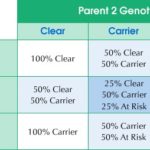Only £55 with results in 7 working days
Our PRA-prcd DNA Test is a fast and effective way of determining whether or not your dog has the potential to develop Progressive Retinal Atrophy, Progressive Rod-Cone Degeneration (PRA-prcd) or pass it on to any offspring.
IMPORTANT: Please check the list below of breeds that can be tested for PRA-prcd before ordering. We can only test the breeds listed below and cancellation charges will apply for orders placed for breeds that we do not test.
![]()
What is Progressive Retinal Atrophy, Progressive Rod-Cone Degeneration?
Progressive Retinal Atrophy, Progressive Rod-Cone Degeneration (PRA-prcd) is an inherited autosomal recessive disorder which causes the cells in a dog’s retina to degenerate and die.
The cells of the retina take light coming into the eyes and transmit the information to the brain where it is interpreted as vision. Rod cells, which operate in low light begin to degenerate first, leading to night-blindness. The cone cells which function in bright-light or daytime conditions deteriorate next and the disease often leads to complete blindness over time.
The symptoms do not usually present until the dog is around 3-5 years old and can result in complete blindness in older dogs.
![]()
What Does the PRA-prcd DNA Test Do?
PRA-prcd DNA Test results are based upon the specific prcd c.5G>A mutation. There are many types of PRA caused by other gene mutations. Clear results for PRA-prcd only pertain to the prcd c.5G>A mutation tested. It will not detect if a dog has any other form of Progressive Retinal Atrophy.
A dog must have two copies of the mutated gene to be affected.
A dog with one copy of the mutation is known as a carrier which means they can pass the mutation on to offspring. Although a carrier will not show any symptoms, if used for breeding, they are likely to pass on the mutated gene 50% of the time. Therefore, breeding a carrier with another carrier will result in a 25% chance that the puppies could inherit one copy of the mutated gene from each parent, and be affected by the disease.
![]()
Which Breeds Can Be Tested?
The PRA-prcd DNA Test can be carried out on the following breeds:
- American Eskimo Dog
- Aussiedoodle
- Australian Cattle Dog
- Australian Cobber Dog
- Australian Labradoodle
- Australian Shepherd
- Australian Stumpy Tail Cattle Dog
- Bernedoodle
- Boykin Spaniel
- Chesapeake Bay Retriever
- Chinese Crested
- Cockapoo
- Cocker Spaniel
- Dachshund – For the specific “Progressive Retinal Atrophy, Cone-Rod Dystrophy 4/cord1″ test , which has a cost of £65, please click here for further information.
- English Cocker Spaniel
- German Shepherd- For the specific “Progressive Retinal Atrophy, Cone-Rod Dystrophy 4/cord1″ test , which has a cost of £65, please click here for further information.
- Giant Schnauzer
- Golden Retriever
- Goldendoodle
- Karelian Bear Dog
- Labradoodle
- Labrador Retriever
- Miniature Australian Shepherd
- Miniature Poodle
- Norwegian Elkhound
- Nova Scotia Duck Tolling Retriever
- Poodle
- Portuguese Water Dog
- Pyrenean Shepherd
- Schipperke
- Silky Terrier
- Standard Poodle
- Yorkipoo
- Yorkshire Terrier
We can test mixed breed dogs as long as one or more of the breeds is listed above. However, it should be noted that the test results will only be relevant to the breed(s) on the list. We cannot test for breeds that are not included in the list above.
![]()
What will PRA-prcd DNA Test Results Tell You?
Using a simple swab from the inner cheek of your dog, we will ascertain whether or not your dog carries the prcd c.5G>A mutation associated with PRA-prcd. We will also inform you whether or not your dog is a carrier of the mutated gene, which allows you to make an informed choice as to whether or not to breed from the dog.
Once we receive the dog’s buccal swabs, we undertake tests that will give one of three possible outcomes:
- A CLEAR result shows that the dog has inherited two genes from its parents that are mutation free. The dog will not develop PRA-prcd and cannot pass faulty genes on to any offspring.
- A CARRIER result indicates that the dog has inherited one normal copy of the relevant gene, and one mutation. This means that the dog has a strong likelihood of passing on the condition to offspring, but not of developing the condition itself. Where a potential mate also carries the gene mutation, any offspring will be at high risk of developing the condition and also of passing it on.
- An AT RISK result indicates that the dog has inherited two copies of the mutated gene from its parents and is highly likely to develop PRA-prcd over the course of its lifetime. It will definitely pass on the mutation to any offspring.
Please click on the image below to view our PRA-prcd DNA Test Result Chart:
![]()
Registration of Dog DNA Test Results
The UK Kennel Club has confirmed that, from 1st August 2018, any DNA test result submitted for inclusion on its database must have at least two forms of identification on the result certificate.
It will be mandatory to include the dog’s microchip or tattoo number along with either the dog’s registered name or registered number. Any test results that do not carry these identifying features will not be accepted.
Our customer support team is always on hand to answer any queries you may have, including questions about collecting DNA samples and understanding the results, to ensure that every test is concluded successfully and without delay. Please Contact Us for a quote or to discuss your requirements.
![]()
Other Dog DNA Tests from AffinityDNA
As well as the PRA-prcd DNA Test we also offer a DNA Test for Canine Degenerative Myelopathy (DM), an Exercise Induced Collapse (EIC) DNA Test, Dog Allergy Testing, Dog Parentage Testing and a choice of dog DNA breed tests which include information about the personality traits and predisposition to diseases for each breed found in your dog’s DNA. Please click on each of the links below for more information:
If you have any questions about PRA-prcd DNA Testing for your dog, please do not hesitate to Contact our Customer Service Team who will be happy to help you.

